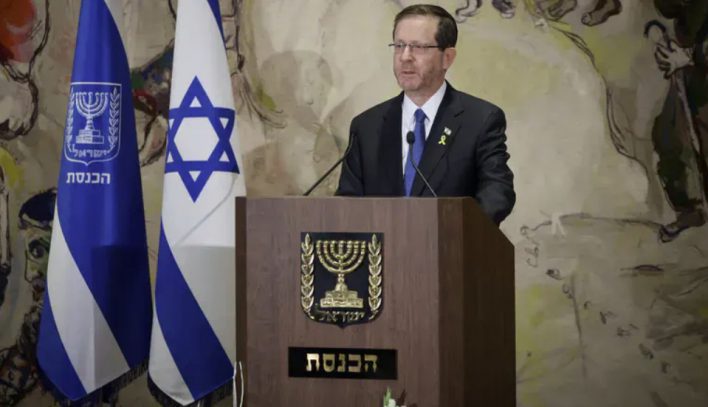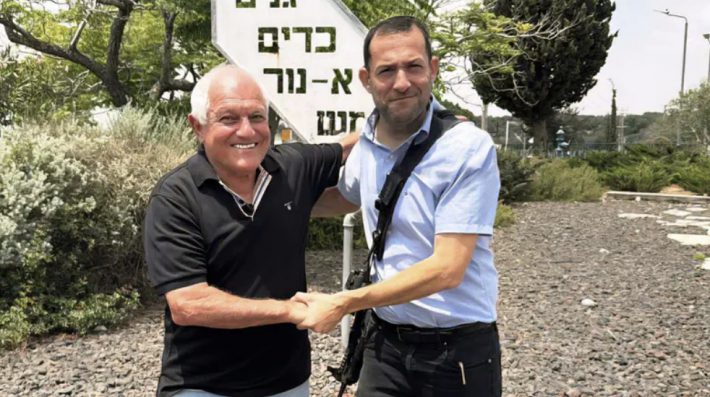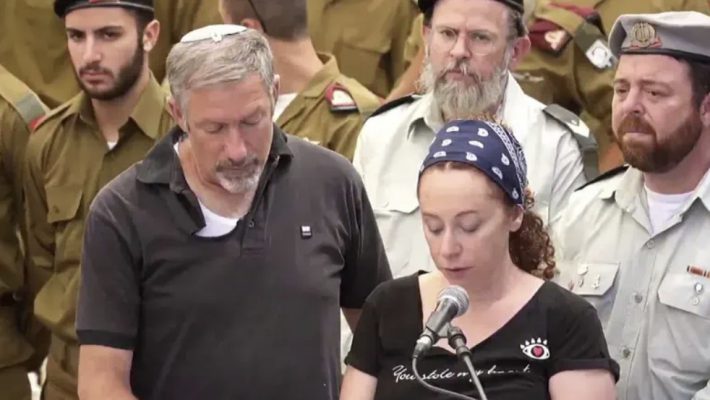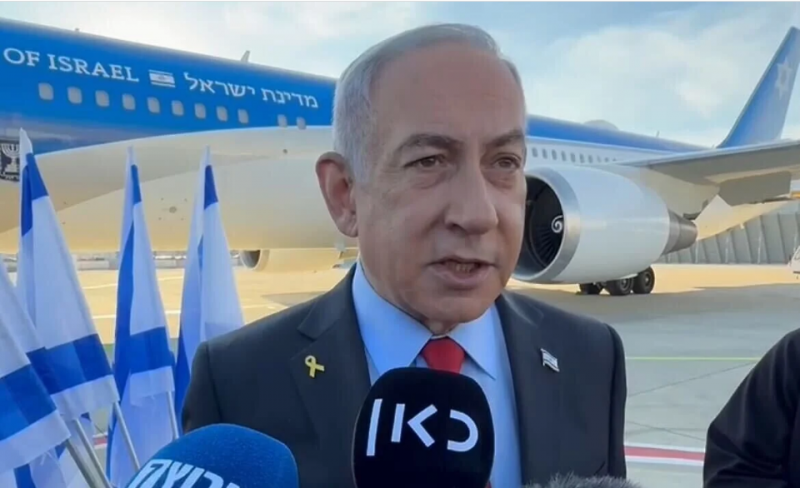President Herzog, in his address at the Holocaust Memorial Day Opening Ceremony at Yad Vashem, warned against polarization and invoked the resilience of survivors.
In recent years, I have made it a personal custom to regularly host Holocaust survivors at the President’s Residence. Almost every week, I have the privilege of meeting them. They arrive in Jerusalem dressed in their finest. Some are nearing ninety; others already closer to one hundred. Sometimes they struggle to walk, sometimes to breathe. Most come accompanied by their families—children, grandchildren, great-grandchildren, even great-great-grandchildren.
I speak with them and hear stories of unfathomable lives. And suddenly, I find myself saying—sometimes quietly to myself, sometimes aloud to them: Look—you prevailed. Look—we prevailed.
They sit with me in the President’s Office, the dearest of people, who witnessed the most horrific atrocities. Some also suffered loss in Israel’s wars. Perhaps surprisingly—or not—they all radiate faith, optimism, and extraordinary inner strength. And all of them—every one, in their multitudes—have one request. One demand.
“We remember the darkest days,” they tell me. “The most terrible deeds. Our loved ones who were slaughtered, burned, tortured to death. We remember a loneliness beyond words—no personal home, no national home. And now, we have been blessed with a wonderful country, built with blood, sweat, and so many tears.”
Then, in a heart-piercing cry, they finish: “Mr. President, please—we beg you, we demand it: the division within us is terrible. Bring unity among our people.”
My sisters and brothers, citizens of Israel: as the voice of those heroic Holocaust survivors, and of a vast public terrified by the polarization and division tearing us apart—I appeal to you from the depths of my heart:
Let us unite, all the House of Israel. Let us transform these days—from now until Independence Day, the Ten Days of Sanctity—into a historic moment of national responsibility. Let us lower the flames. Let us mend our hearts.
Let us not allow the poison of social media, or the experts of incitement and polarization, to seize our national soul and destroy us from within. Let us mourn together, yearn together; let us hurt together—and yes, today as well, let us stand tall—together.
Let us unite in a cry and a prayer: for the urgent and immediate return of all the hostages and captives from the murderers of Hamas—both the living and the fallen. Let us pledge together to act with all our might. To neither rest nor be still until they all return. All of them. Until the last one.
I turn now to our kidnapped brothers and sisters—who may hear us—and say: a whole nation is with you. A whole nation misses you, worries for you, cries out your cries. A whole nation, anguished and tormented, its soul scorched—knows it will find no comfort or solace until you all return home.
Let us pray together for the success and safety of the IDF soldiers, of all the security and internal security forces and their commanders. For the healing—of body and soul—of all the wounded.
Let us embrace together the bereaved families—beloved and sacred—who cry out to us again and again: this is the moment to be worthy of them. Together.
Eighty years after the Allied victory, we gather again this evening. We remember the victims—and at the same time mark the victory: the triumph of light over darkness, of morality over the most terrible evil, of the human spirit—the Jewish spirit—over monstrous hatred.
But this day, Holocaust Remembrance Day, is not only a day for looking backward. I speak here not only eighty years after the Holocaust, but also a year and a half after the greatest massacre our people have endured since the Holocaust—when we are still wounded and bleeding, reeling and anxious.
And so, I wish to lift up the sanctity of this day, even as our nation looks forward—internalizing what I believe is the most crucial lesson and imperative: Just as we overcame eighty years ago—so shall we prevail again. It is embedded in us—in our deepest national DNA. For the Eternity of Israel will not falter. Ever.
On the inside of Tomi Schwartz’s left forearm, Auschwitz tattooed the number 14295B. Tomi was born in Nitra, Slovakia. He was only six years old, a first grader, when the war began. His parents, sensing the tightening ring of antisemitic and murderous fire, tried to escape with Tomi and his two brothers, to hide—but in vain.
Tomi and his family witnessed horror at every stage: the decrees stripping Jews of rights, the violence, the deportations, the mass murders of their friends and loved ones. The long arm of the Nazi killing machine eventually reached them. They were sent to the Sered concentration camp in Slovakia.
From there, they were taken to Auschwitz—in cattle cars, without food or water, in filth and terror, alongside corpses of those who did not survive. In Auschwitz, young Tomi was separated from his family. Just nine years old, alone in the heart of the death camp, he was put in charge of ten other children—starving, wounded, terrified. Within three months, nine of the ten children—Tomi’s children—were dead.
On January 27, 1945, the 13th of Shevat 5705, Soviet forces arrived at Auschwitz. They found the final remnants of families, the last survivors of once-glorious communities. Among them: Tomi, ten and a half years old. In the famous photograph taken by the liberators, he appears by the fence—last on the left. “I chose life,” Tomi said of that moment of liberation from the Nazi monster.
Tomi immigrated to Israel, built a family, and became a beloved educator. We are privileged that he is here with us tonight. In January, when the world marked 80 years since Auschwitz’s liberation, Tomi was invited to the ceremony at the camp—but chose instead to mark victory over the Nazi beast aboard an Israeli Navy ship, symbolically named “INS Victory.” At his side: his granddaughter, Captain A., the ship’s deputy commander.
Exactly eighty years after his liberation—alone, hungry, freezing in the worst inferno—Tomi Schwartz-Shacham stood on a warship of the State of Israel and told his personal story of triumph. “Eighty years since Auschwitz, and I stand here to give you testimony,” he said emotionally to the IDF soldiers. “There is no greater victory than this!”
Nearly 2,000 kilometers away, in Benghazi, Libya—another incarnation of the same hell. Yosef Lavi was a young teenager when he and his family were expelled from their home and sent to the notorious Giado concentration camp. From Giado, he was deported to Italy, then to Bergen-Belsen in Germany.
In Bergen-Belsen, one prisoner learned Yosef had not had a bar mitzvah. He gave him a prayer shawl, so that Yosef could have the ceremony—even with death hovering overhead. After the war, Yosef immigrated to Israel and joined the Palmach. During the War of Independence, he fought to break the siege of Jerusalem.
Yosef kept that prayer shawl until his dying day—as a symbol of faith, of hope, of victory. When asked how he survived, he answered: “The prayer shawl reminded me who I am, where I came from, and that a future still awaited me.”
Upon the liberation of Giado, one of the great sages of Djerba, Rabbi Shaul Sheli Mekiketz, composed a liturgical poem that echoed the Book of Psalms: “A people once created shall praise the Lord.” But he slightly altered it. Instead of “once created,” he wrote: “Hallelujah! A people created.” Even in a ruined world, Rabbi Sheli saw renewal. He saw victory. He saw the future. And he cried: Hallelujah.
Hallelujah—for the people who rose from death to life, from destruction to rebirth. Hallelujah—for the people who, even in the midst of suffering and loss, always held fast to hope, to redemption, to the belief that victory would come.
My sisters and brothers, tomorrow I will lead, on behalf of the State of Israel, the March of the Living in Auschwitz—in memory of the murdered, in honor of the survivors, for the sake of generations to come. Eighty years after the camp’s liberation and the great victory, I will walk through the gates of that terrible hell, beneath the chimneys from which our brothers rose heavenward—in my role as President of the Jewish and democratic State of Israel—together with survivors, bereaved families, former hostages, and all who bear witness.
I will march with the memory of the millions engraved on my heart—and with the shadow of the poisoned cup we drank on that cursed day, just a year and a half ago.
For while we know—know well—that nothing can compare to the scope and systematic nature of the Holocaust, it is impossible to hear the terrifying testimonies from the inferno of October 7, or to see the images of the hostages—from the death pits of Gaza—and not be shaken by the echoes of that historic catastrophe.
The voice of our brothers’ blood cries to us from the ground. We must bring them home—urgently.
And not only the imprint of horror past and present will be before me, but also the deep hope and faith we inherited from you—our beloved survivors, our heroes of rebirth. Hope and faith woven into one word: Hallelujah.
Hallelujah, like Yosef’s great triumph with the prayer shawl. Hallelujah, like Tommy’s great triumph—with his granddaughter officer—on the deck of the “INS Victory.” Hallelujah, like the triumph of the eternal people, who find light even in the deepest darkness.
At this most sacred moment I say, without hesitation: If we were able to rise from the darkest abyss in human history—we will always succeed. Always. I know—the journey will not be easy. But it will happen. There is only one condition. One alone: we must do it together.
We are living through days of fierce and painful division. And the overwhelming majority of our people cry out with all their might: Enough! Enough with the polarization. Enough with the hatred. History will not forgive those who act irresponsibly and tear us apart from within. History will not forgive those who weaken the foundations of our wonderful country—beloved, unique, Jewish and democratic—born from the ashes of the terrible Holocaust.
Our shared rebuilding, after this great fracture, is a tremendous and historic mission—not upon one person, or one community, or one camp—but upon all of us: as a nation, as a society, as individuals.
And so I say to you—to the people of Israel and to our brothers and sisters in the Diaspora: We shall overcome, again. We will face every challenge and every enemy. Together. And we will prove, again and again: “the Eternity of Israel holds true”.
May the memory of the millions who perished in the Holocaust be blessed—and safeguarded in the heart of our people, from generation to generation.





